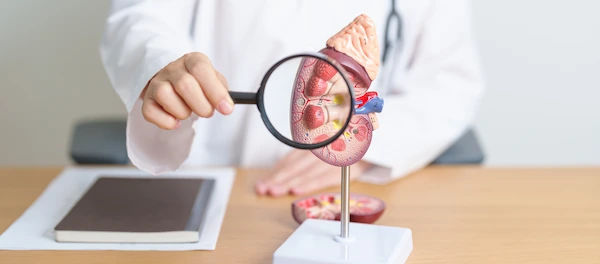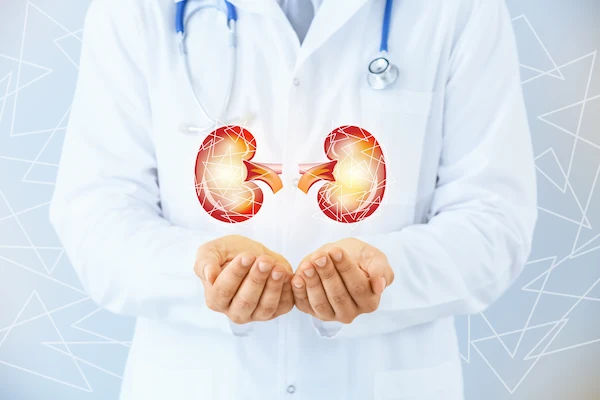Kidney Stone Symptoms, Causes and Treatment
Kidney stones are hard mineral deposits that can cause severe pain and urinary issues. Learn about their symptoms, causes, diagnosis methods, treatment options, and how to prevent them.

Written by Dr. Rohinipriyanka Pondugula
Reviewed by Dr. M L Ezhilarasan MBBS
Last updated on 25th Aug, 2025

Kidney stones are small, hard deposits that form inside your kidneys. They can be as tiny as a grain of sand or as large as a golf ball. While some stones pass out of the body without much trouble, others can cause severe pain and complications. Understanding the symptoms, causes, and treatment options can help you manage this condition effectively.
What Are Kidney Stones?
Kidney stones are solid masses made of minerals and salts that crystallize in the urine. They can develop in one or both kidneys and may travel down the urinary tract, causing discomfort.
Common Types of Kidney Stones:
1. Calcium Stones – The most common type, usually made of calcium oxalate.
2. Uric Acid Stones – Form when urine is too acidic, often due to high protein intake.
3. Struvite Stones – Caused by urinary tract infections (UTIs).
4. Cystine Stones – Rare and hereditary, caused by a condition called cystinuria.
Symptoms of Kidney Stones
Kidney stones may not cause symptoms until they start moving within the kidney or pass into the ureter (the tube connecting the kidney to the bladder). Common signs include:
- Severe pain in the side, back, or lower abdomen
- Pain that radiates to the groin
- Painful urination
- Pink, red, or brown urine (blood in urine)
- Frequent urge to urinate
- Cloudy or foul-smelling urine
- Nausea and vomiting
- Fever and chills (if an infection is present)
If you experience intense pain along with fever, seek medical help immediately, as this could indicate a serious infection.
What Causes Kidney Stones?
Several factors contribute to kidney stone formation:
1. Dehydration – Not drinking enough water leads to concentrated urine, increasing stone risk.
2. Diet – High intake of salt, sugar, animal protein, or oxalate-rich foods (spinach, nuts, chocolate).
3. Obesity – Excess weight can alter urine composition.
4. Medical Conditions – Gout, hyperparathyroidism, and UTIs increase risk.
5. Family History – If someone in your family has had kidney stones, you may be more prone to them.
6. Certain Medications – Diuretics, calcium-based antacids, and some antibiotics can contribute.
Consult Top General Practitioner
How Are Kidney Stones Diagnosed?
If you suspect kidney stones, your doctor may recommend:
- Urine Test – Checks for minerals that form stones.
- Blood Test – Measures calcium, uric acid, and kidney function.
- Imaging Tests – Ultrasound, CT scan, or X-ray to locate stones.
Get Your Symptoms Checked now.
Treatment Options for Kidney Stones
Treatment depends on the size and type of stone:
1. Small Stones (Passing Naturally)
- Drink plenty of water (2-3 liters/day) to help flush out the stone.
- Pain relievers (like ibuprofen) can ease discomfort.
- Alpha-blockers (prescribed by a doctor) relax ureter muscles, helping stones pass.
2. Large Stones (Medical Intervention Needed)
- Extracorporeal Shock Wave Lithotripsy (ESWL) – Uses sound waves to break stones into smaller pieces.
- Ureteroscopy – A thin scope is inserted to remove or break the stone.
- Percutaneous Nephrolithotomy – A small incision is made to remove large stones.
How to Prevent Kidney Stones?
Preventing kidney stones involves simple lifestyle changes:
- Stay Hydrated – Drink at least 8-10 glasses of water daily.
- Reduce Salt Intake – Avoid processed foods and excess salt.
- Limit Oxalate-Rich Foods – Spinach, nuts, tea, and chocolate in moderation.
- Eat More Citrus Fruits – Lemons and oranges help prevent stone formation.
- Maintain a Healthy Weight – Exercise regularly and eat a balanced diet.
When to See a Doctor?
Consult a doctor if you experience:
- Unbearable pain
- Blood in urine
- Fever with pain
- Difficulty passing urine
Early diagnosis and treatment can prevent complications.
Need Help? Book a Consultation Today!
If you suspect kidney stones or need expert advice, Apollo 24|7 offers easy online consultations with specialists. Schedule an appointment today for personalized care and treatment.
Consult Top General Practitioner
Consult Top General Practitioner

Dr Syed Mateen Pasha
General Physician
2 Years • MBBS
Bengaluru
PRESTIGE SHANTHINIKETAN - SOCIETY CLINIC, Bengaluru

Dr. Gunashree V L
General Physician/ Internal Medicine Specialist
3 Years • MBBS
Bengaluru
Apollo Clinic, JP nagar, Bengaluru

Dr Suseela
General Physician
5 Years • MBBS
Bengaluru
Apollo Medical Center, Marathahalli, Bengaluru

Dr. Avinash Pasuparthy
General Practitioner
5 Years • MBBS
Visakhapatnam
Apollo Clinic Vizag, Visakhapatnam

Dr. Riti Srivastava
General Practitioner
12 Years • MD (Physician)
Gautam Buddha Nagar
Shri Krishna Clinic, Gautam Buddha Nagar
Consult Top General Practitioner

Dr Syed Mateen Pasha
General Physician
2 Years • MBBS
Bengaluru
PRESTIGE SHANTHINIKETAN - SOCIETY CLINIC, Bengaluru

Dr. Gunashree V L
General Physician/ Internal Medicine Specialist
3 Years • MBBS
Bengaluru
Apollo Clinic, JP nagar, Bengaluru

Dr Suseela
General Physician
5 Years • MBBS
Bengaluru
Apollo Medical Center, Marathahalli, Bengaluru

Dr. Avinash Pasuparthy
General Practitioner
5 Years • MBBS
Visakhapatnam
Apollo Clinic Vizag, Visakhapatnam

Dr. Riti Srivastava
General Practitioner
12 Years • MD (Physician)
Gautam Buddha Nagar
Shri Krishna Clinic, Gautam Buddha Nagar



